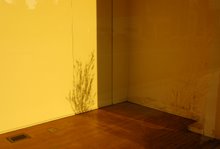
I'm taking the weekend off to float down the New River, stare up at the cirrus clouds stirring overhead like the mane of my dad's finest mare, and ponder my metaphysical malaise.
I'll leave you with Rilke's "Archaic Torso of Apollo." Around the time he wrote this poem, Rilke was working for the sculptor, Rodin. Rilke wanted to write poems with the same physical power as Rodin's sculptures. He asked Rodin for advice, and Rodin gave him several assignments, two of which were: to go to the zoo and look at an animal until he truly saw it, and to visit the Louvre, choose something, and write about what he chose. This advice seems as fitting for photographers as for poets; to observe the world closely, paying attention to the unnoticed, the small, and the concealed. One of Rilke's most powerful poems, "The Panther," resulted from his visits to the zoo; and this poem, dedicated to Rodin, resulted from his visits to the Louvre.
Archaïscher Torso Apollos
Wir kannten nicht sein unerhörtes Haupt,
darin die Augenäpfel reiften. Aber
sein Torso glüht wie ein Kandelaber,
in dem sein Schauen, nur zurückgeschraubt,
sich hält und glänzt. Sonst könnte nicht der Bug
der Brust dich blenden, und im leisen Drehen
der Lenden könnte nicht ein Lächeln gehen
zu jener Mitte, die die Zeugung trug.
Sonst stünde dieser Stein enstellt und kurz
unter der Schultern durchsichtigem Sturz
und flimmerte nicht wie Raubtierfelle;
und bräche nicht aus allen seinen Rändern
aus wie ein Stern: denn da ist keine Stelle,
die dich nicht sieht. Du mußt dein Leben ändern.
Archaic Torso of Apollo
We cannot know his legendary head
with eyes like ripening fruit. And yet his torso
is still suffused with brilliance from inside,
like a lamp, in which his gaze, now turned to low,
gleams in all its power. Otherwise
the curved breast could not dazzle you so, nor could
a smile run through the placid hips and thighs
to that dark center where procreation flared.
Otherwise this stone would seem defaced
beneath the translucent cascade of the shoulders
and would not glisten like a wild beast's fur:
would not, from all the borders of itself,
burst like a star: for here there is no place
that does not see you. You must change your life.

1 comment:
Be still my heart! German poetry and Rodin, you should always post your entries immediately after talking to me. I imagine I would find them catering to my tastes more frequently if you did.
I'm not sure if I actually like Rilke's poetry (German poetry, in general, does excite me though). Because it is not my first language, I find myself preferring poems to flow a little easier than Rilke's works generally do. Even his softer poems (check out Abend) end up sounding harsh to me. I don't think it's just the language; I recently posted that Eichendorff poem auf Deutsch and I think it's quite lovely. I occasionally think about trying to improve my German and I think that, if I did, I might appreciate Rilke more. Is he one that you're fond of? Check out Landman's translation of Archaischer Torso Apollos. I think it fits the rhythm and feel of the original well.
Post a Comment